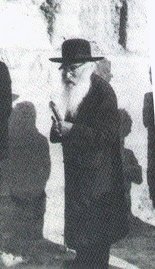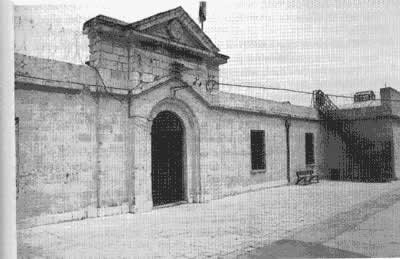|
|
February Purim 1999 |
|
|
February Purim 1999 |

|
|
Search our Archives: » Home» History » Holidays » Humor » Places » Thought » Opinion & Society » Writings » Customs » Misc. |
Aryeh Levin © by Dovid Rossoff As the month of Adar approaches, we sense a new spirit of freedom. In modern lingo it is called Spring fever. Surely, we anticipate nothing less than the miraculous. And why not? Often someone who enters our lives and gives us new direction stirs this new momentum to the forefront. As much as he give us, we sometimes have the ability to repay him in some, albeit, indirect way. The following two stories show this – and much more. Father of the Prisoners AS EARLY as 1927, Rav Aryeh Levin began visiting Jewish prisoners who had been found guilty of political crimes like possessing a weapon or smuggling contraband into the country. The British overseers of Palestine stiffened their grip on the necks of the Jews in direct proportion to the Arabs’ penchant for stirring up violent riots. In response, the Jewish underground, comprising groups like the Haganah, the Palmach, and the Irgun increased their activities, which led to many of their members being jailed. In 1931 the British authorities requested that the Chief Rabbi appoint a prison chaplain who would visit the captives on Shabbos. Rav Kook turned to Rav Aryeh Levin, who worked as the supervisor in the Etz Chaim Talmud Torah, and asked him to take the position. Rav Aryeh accepted, on the condition that he would not receive any compensation for his time. Every Shabbos morning Rav Aryeh walked from his house in Mishkenos to the Russian Compound, where the main Jerusalem prison was located. He prayed together with the prisoners, sat and talked with each one, acted as an emissary between them and their families, and generally filled the vacuum in their lives. He never tried to force his religious values on them; at most he gave them a Book of Psalms to read. The inmates were captivated by his genuine warmth and sincerity, and the honor and respect with which he treated them. At one point, the Arab inmates even became jealous of their Jewish cell mates, for their Mufti’s visits were guarded and aloof, cold and distant. Rav Aryeh would take each inmate’s hand and cup it inside his own. Slowly he would rub and squeeze the prisoner’s hand as he sat and talked with him. His eyes radiated love and comradeship, and he spoke soft and soothing words of encouragement. Even the most stubborn prisoners succumbed to his simple, untainted love for his fellow Jew. The most heartbreaking situation he encountered was the predicament of the prisoners that were condemned to death. Rav Aryeh made every effort to appeal the sentences and reduce the punishment. Once he even threw himself in front of the High Commissioner’s moving limousine in order to present his petition to him. Concerning those he could not save, like Dov Groner, Moshe Barzani, and Meir Feinstein, Rav Aryeh said: “None of us has any idea how high is the spiritual rank of these martyrs.”
 Aryeh Levin at the Kotel
The prisoners themselves spoke of his influence on them. Following are some of the comments they made about him: “We counted our days in prison according to Rav Aryeh’s visits.” “I still thank the God of Israel that as the door of Cell 48 opened to lead me into an unknown future into life behind bars, He sent me this good angel of His.” “If you never saw a camp of prisoners receive Rav Aryeh and give him welcome, you cannot know the power of love and faith.” “About this Jew there was always a wondrous aura.” “Whoever didn’t experience his unique handshake cannot understand its essence. One hand shook yours in greeting; and the other patted it in affection, as he spoke with you in his calm and reassuring manner.” “His eyes illuminated the darkness of our cells... For us he was a bridge to the past generations, a link of prayer with the Almighty.” Mattityahu Shmuelevitz, whose death sentence was commuted to life imprisonment, wrote in a letter to a friend: “Yet there is one person in particular to whom I remain grateful first and foremost; a dear, precious Jew about whom you told me nothing; but it was he who stormed heaven and earth for me; and more important — it was he who brought me closer to my Maker in those fateful days... He left and we remained in the prison. He couldn’t take us with him out into the free world, but he always brought the outside world in to us.” In 1965 (5725), Rav Levin was honored at a ceremony assembled by the veteran underground resistance fighters from the Mandate period. Timed to take place on his eightieth birthday, it was held in the courtyard of the old central prison in the Russian Compound. Rav Aryeh stood up to speak. “The importance of this assembly is that it has brought friends together. Moreover, this good meeting is taking place on the other side of the prison bars...It particularly makes my heart glad to see the families of the prisoners, especially the little children, since I have always loved small children.” Then he added, “I do not know if I shall be privileged to be with you again like this. All I ask of you is this: Tell your children: There was an old Jew in Jerusalem who loved us so very much!” With that he burst into tears, and among the thousands of people there, not a dry eye was to be found. Paralysis and the Pledge SHABBOS IN Jerusalem’s central prison was as one would have expected. There was happy anticipation in the air as the prisoners waited for the arrival of Rav Aryeh Levin, who would bring some light and hope into their otherwise drab existence. Rav Levin arrived on time for his regular weekly visit. As usual, he had the prisoners join in the morning prayer service; and as usual, when the time came, he began reading the weekly portion from the Torah scroll.  Prision where the Jewish Prisoners were Kept As he was in the middle of the Torah reading, one of the Arab guards approached and asked him to come outside, as there were people waiting for him. Rav Aryeh, however, had no wish to interrupt the reading and motioned to the guard to be so kind as to wait until he was finished. A few minutes passed by and once again the guard appeared with the same request. Once more, though, the rabbi motioned to him to wait until he finished reading from the sefer Torah. Soon, however, the captain of the guard himself came, and asked Rav Levin to accompany him. There could be no further doubt: something quite serious must be afoot. Rav Aryeh asked one of the inmates to continue the reading, and he left the cell with the captain of the guard. Once outside, he saw his son-in-law waiting for him at the prison entrance. In his heart he knew at once that some accident had occurred. However, he did not utter a word, and with the wisdom of silence between them they set off by foot to the Shaarei Chesed neighborhood, where his married daughter lived. As they reached his daughter’s home, Rav Aryeh saw members of the family and medical doctors gathered there. It was then that he learned the news: his daughter had been stricken by paralysis. The only comfort the doctors could give him was that in their opinion, her total incapacitation would likely give way to partial paralysis over the course of time, and perhaps in a number of years she would recover completely. After an emotional meeting with his daughter, he reminded members of the family that “the rescuing help of the Lord can come in the twinkling of an eye.” That night, when Shabbos was over, the Arab guard from the prison knocked at his door. Burning with curiosity, the inmates at the jail had bribed him to go to Rav Levin’s home and find out the reason for his sudden departure. Rav Aryeh explained what had happened and told them not to worry. The next Shabbos the prisoners flocked around him and asked how his daughter was. “As well as can be expected,” he said emotionally. During the Torah reading, an unusual thing occurred during the mi-sheberach prayer recited after each of the seven aliyos, in which one asks the Lord to bless and protect the man just called to the Torah. It is customary that the man called to the Torah pledges a sum to charity. As Rav Aryeh duly recited the mi-sheberach for the first prisoner called to the Torah, he was taken by surprise to hear the man announce that he was pledging a day of his life for the recovery of the good rabbi’s daughter. When the time came for the mi-sheberach of the second called, he announced that he forfeited a week of his life for the sake of the sick woman. The third man called pledged a month of his lifespan; and so it went. At last it was the turn of the seventh man, Dov Tamari, who later became a professor at the Technion in Haifa. “What is our life in prison worth,” he cried, “compared to our rabbi’s anguish? I pledge all the remaining days of my life to the complete recovery of our rabbi’s daughter!” Rav Aryeh looked at the young man and burst into tears. He was moved beyond words to see how devoted these men were to him and how much affection they bore him. Unable to continue with the prayer service, he shook hands warmly with every single one of the inmates and went straight home. That evening, after Shabbos, members of his family came to tell him that his daughter was beginning to show signs of recovery: she had started to move some limbs. A few days went by, and her health returned completely, in utter contradiction to the medical prognosis, which predicted a long period of illness and convalescence. 
© by Dovid Rossoff
from theFebruary Purim 1999 Edition of the Jewish Magazine
|

|
PAGE | | | US | | | DONATION | | | ARTICLE | | | US | | | SUBSCRIPTION | | | ARCHIVES |